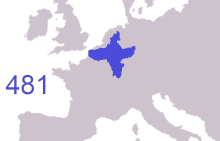486
Appearance
This article needs additional citations for verification. (November 2024) |
| Millennium: | 1st millennium |
|---|---|
| Centuries: | |
| Decades: | |
| Years: |
| 486 by topic |
|---|
| Leaders |
| Categories |
| Gregorian calendar | 486 CDLXXXVI |
| Ab urbe condita | 1239 |
| Assyrian calendar | 5236 |
| Balinese saka calendar | 407–408 |
| Bengali calendar | −108 – −107 |
| Berber calendar | 1436 |
| Buddhist calendar | 1030 |
| Burmese calendar | −152 |
| Byzantine calendar | 5994–5995 |
| Chinese calendar | 乙丑年 (Wood Ox) 3183 or 2976 — to — 丙寅年 (Fire Tiger) 3184 or 2977 |
| Coptic calendar | 202–203 |
| Discordian calendar | 1652 |
| Ethiopian calendar | 478–479 |
| Hebrew calendar | 4246–4247 |
| Hindu calendars | |
| - Vikram Samvat | 542–543 |
| - Shaka Samvat | 407–408 |
| - Kali Yuga | 3586–3587 |
| Holocene calendar | 10486 |
| Iranian calendar | 136 BP – 135 BP |
| Islamic calendar | 140 BH – 139 BH |
| Javanese calendar | 372–373 |
| Julian calendar | 486 CDLXXXVI |
| Korean calendar | 2819 |
| Minguo calendar | 1426 before ROC 民前1426年 |
| Nanakshahi calendar | −982 |
| Seleucid era | 797/798 AG |
| Thai solar calendar | 1028–1029 |
| Tibetan calendar | 阴木牛年 (female Wood-Ox) 612 or 231 or −541 — to — 阳火虎年 (male Fire-Tiger) 613 or 232 or −540 |

Year 486 (CDLXXXVI) was a common year starting on Wednesday of the Julian calendar. At the time, it was known as the Year of the Consulship of Basilius and Longinus (or, less frequently, year 1239 Ab urbe condita). The denomination 486 for this year has been used since the early medieval period, when the Anno Domini calendar era became the prevalent method in Europe for naming years.
Events
[edit]By place
[edit]Europe
[edit]- Battle of Soissons: Frankish forces under King Clovis I defeat the Gallo-Roman kingdom of Soissons (Gaul).[1] Roman rule under Syagrius ends. The land between the Somme and the Loire becomes a part of the Frankish Empire. Syagrius flees to the Visigoths (under King Alaric II), but Clovis threatens war, and he is handed over for execution.
- Clovis I establishes his new residence at Soissons. He appoints Ragnachar, Frankish petty king (regulus), as his deputy ruler.
By topic
[edit]Religion
[edit]- Persian Christians who follow Nestorianism gather in the second Council of Seleucia (modern Turkey).
Births
[edit]This section is empty. You can help by adding to it. (October 2017) |
Deaths
[edit]References
[edit]- ^ MacGeorge, Patricia (December 5, 2002). Late Roman Warlords. Oxford, England: Oxford University Press. pp. XIV. ISBN 9780191530913.
